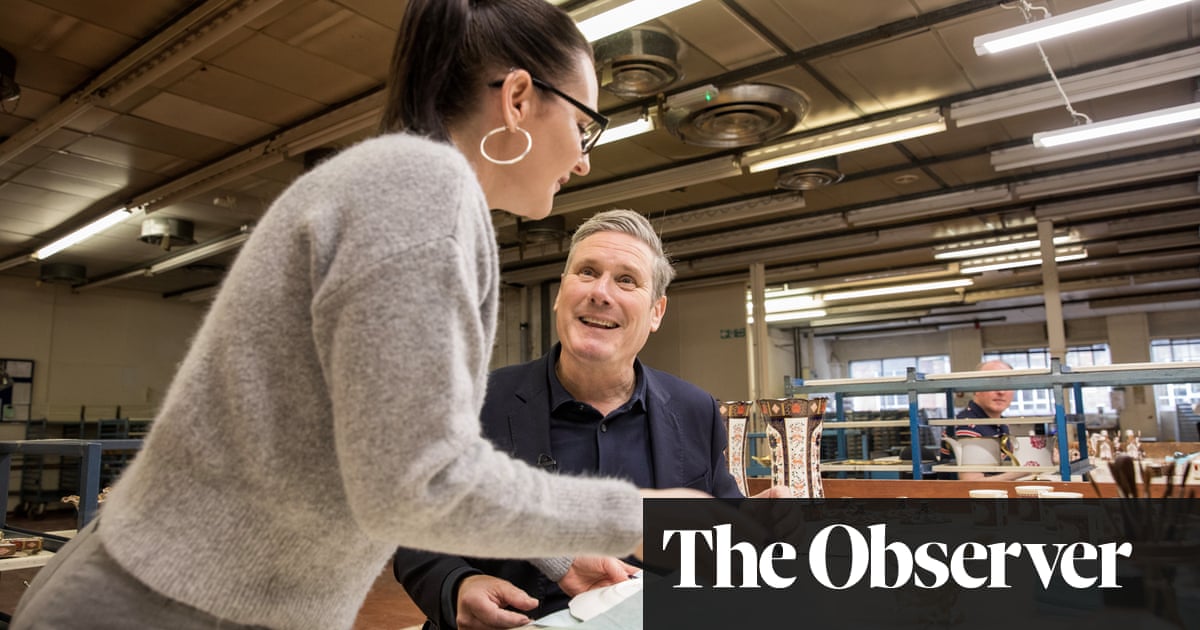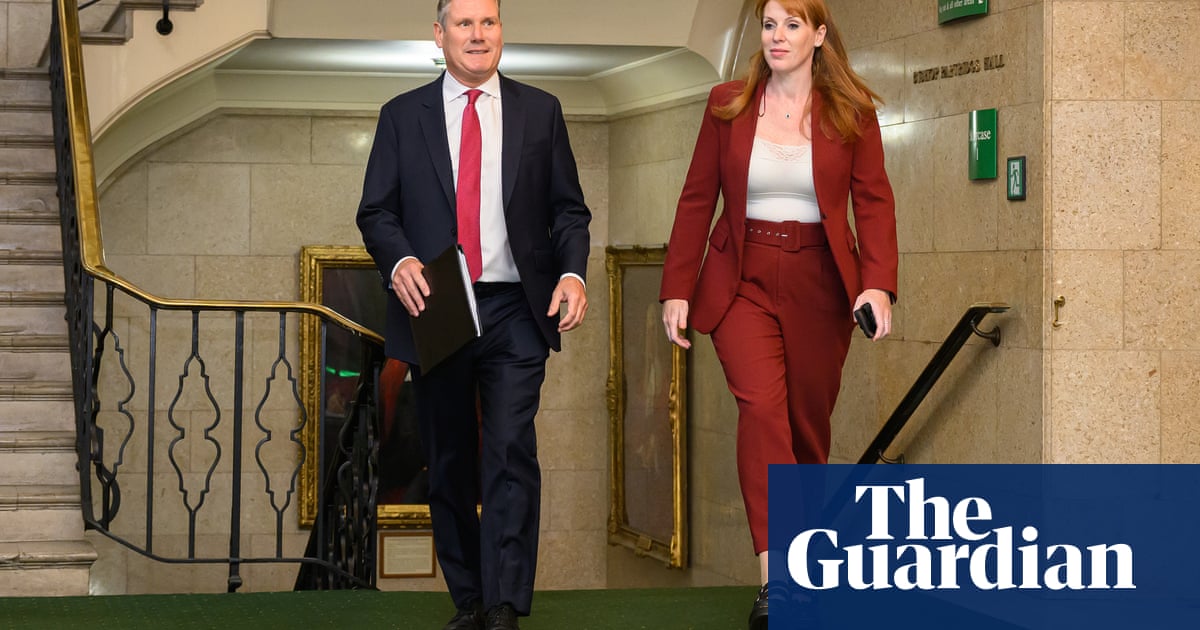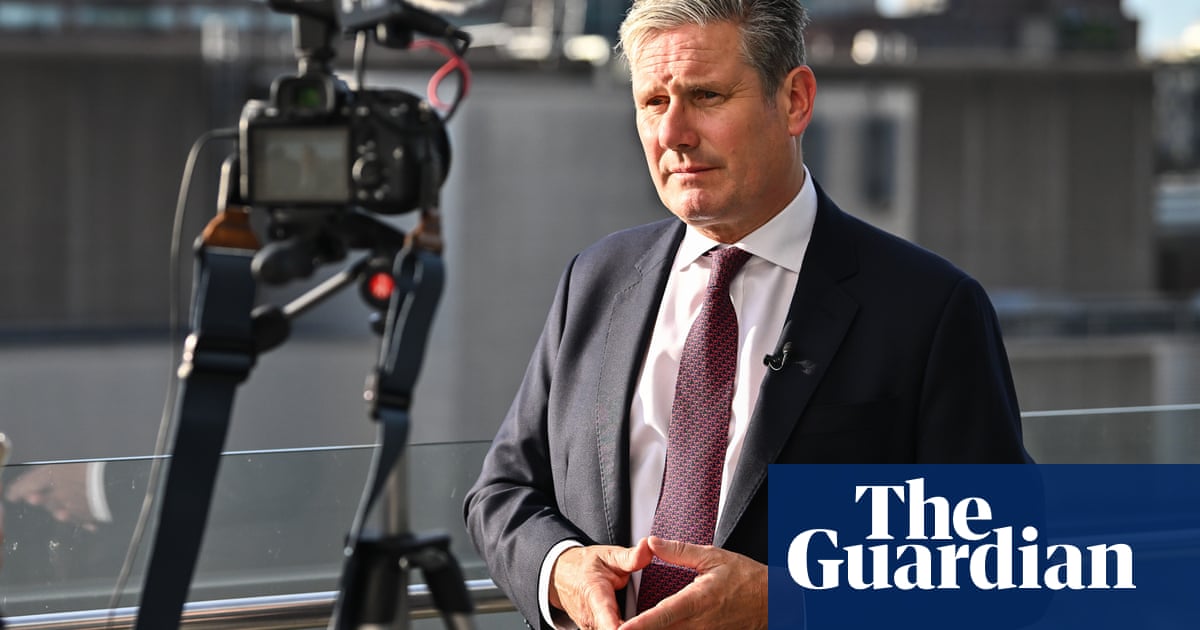
Keir Starmer is being shown around the Royal Crown Derby factory in the east Midlands city, and the reasons for choosing the venue are clear. We are days away from crucial local elections on Thursday and the coronation of King Charles III will take place two days later.
The visit has been carefully choreographed to convey messages about respect for tradition, and how Labour has changed. A big party media team is up from London and their attention to detail is impressive – reminiscent of New Labour before the 1997 general election.
Winning control of Derby city council is a key target for the party on Thursday, so talking to local people about the cost of living crisis and visiting local factories matters. But there are other impressions and images that Starmer and his aides want to project.
As he examines sparkling new King Charles III commemorative mugs, teapots and plates that are selling out fast, it is clear that Starmer – unlike his predecessor, the republican Jeremy Corbyn – is very much up for the coronation and the outburst of patriotism it will engender.
“I don’t know who I will be sitting next to in Westminster Abbey yet, but I am looking forward to it,” he says.
Thursday’s elections are a key stepping stone for the Labour leader on what he hopes will be a path leading into Downing Street next year. His aides know they are at an important juncture in their bid to oust the Tories after 13 years.
Despite all the effort being put into branding, Starmer is, however, still seen by many commentators as dull and wooden and has yet to make enough of an impact with the public. Too few people know what he would do in power.
There is a strategic challenge that his team recognises. The party is trying to argue both that the Tories have completely wrecked the economy and public services, while at the same time convincing voters that Labour can transform everything with meagre amounts of public money.
The Labour leader sees a way through the conundrum, by asking people to approach it stage by stage. “It is important that everybody asks themselves: am I better off now than I was when this government started 13 years ago? Is our health service working better? Have my wages gone up in real terms? Is the criminal justice system better? Is anything better? And the answer to those questions is going to be no, no, no, no, no.
“So therefore we need change. We have to be the party of change. Are we going to inherit a very broken country including the economy? Yes we are. I accept that. But I don’t accept that that means that we can’t inject real purpose and meaning into change.”
There are signs here of a change of gear, of Starmer talking as much about what Labour would do as about Tory failures. But exactly how would he bring about that change, when Labour is promoting itself as ultra-fiscally responsible and prudent?
Somewhat inevitably, he says the answer lies in getting the economy growing. This can be done, he argues, by ensuring the UK becomes a world leader in a green industrial revolution and through redistributing power to the regions to take advantage of the opportunities of tackling the climate crisis.
“Clean energy by 2030 is critically essential, and we will be part of the global race that is already on in relation to renewables,” he says.
On devolving economic power, he seems genuinely committed to giving it away as soon as he gets it: “There is a theory of growth that says you could grow London and the south-east even faster and then redistribute to the rest of the country. I reject that model, as I want growth in every part of the country. Will we suck up power to the centre and run it all from Westminster and Whitehall? Answer no. Not the next Labour government.”
The Labour leader’s rhetoric is becoming far bolder even if much of the detail has yet to emerge, perhaps because he knows the Tories will steal his ideas if he reveals his cards too soon. Starmer says he wants to go “further than Blair on [reforming] public services”, drawing on his own experience of running the Crown Prosecution Service.
“This will be a bold and reforming Labour government bringing about real change that I hope will be felt through the generations,” he says.
“I think we can go beyond what the Blair government did on public services … because I think there is unfinished business there.”
He insists this does not mean more involvement of the private sector, but rather tailoring services more to individuals’ needs with an emphasis on prevention. “Every crime case tells a story about education, about housing, about parenting. There are very few cases that would not have had a different outcome if our public services had operated differently.”
On Sunday, in a significant policy move, Labour will announce concrete plans to restore targets for housebuilding that were scrapped recently by the Tories, and pledges to hand more power to local authorities, so that 300,000 new houses can be built every year. Starmer says first-time buyers will be given priority on any new houses built in their areas, and that overseas buyers would be prevented from purchasing them.
He wants Labour to become the party of homeowners. “The dream of home ownership has been killed by the prime minister because he has taken those targets away. I want Labour to be the party of home ownership.”
To further help young people, Starmer also promises to mend the current system of student financing to stop young people becoming burdened with piles of debt before they even get into work.
In his leadership election campaign in 2019, Starmer pledged to abolish student fees altogether, so they will want to hold him to his word. Now he is far more guarded about precisely how far he can go, saying that “obviously the financial situation has changed since 2019”. But he adds that “the current system is broken … we have got to change it …we are looking at options.”
Setting Labour a deliberately unambitious target for Thursday’s council elections, he says that if his party gains just 400 seats, it will represent good progress. Privately, however, senior party figures believe they will need to do much better than that if they are to show that enough people are beginning to believe that Keir Starmer has the answers to their problems.











